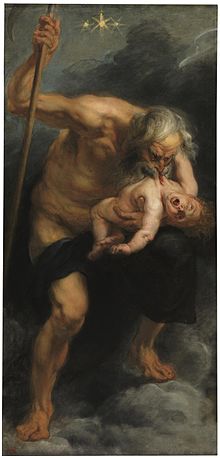Saturn (mythology)

Saturn ( Latin Saturnus ) is the god of sowing in Roman mythology . He was identified early on with the Greek Kronos .
myth
Above all, Saturn was the god of agriculture and was considered a symbol of the mythical Golden Age , the Saturnia regna .
Saturn was identified with the Greek titan Kronos . Accordingly, he was also reported to have overpowered and castrated his father and then devoured his children until he was finally overthrown by his sixth child, Jupiter .
Deviating from the myth of Kronos, Saturn fled to Latium together with Ops (she corresponds to the Greek Rhea ), the Roman goddess of the harvest blessing and fertility, after his loss of power . There he was accepted by Janus and taught the people of Lazio the art of agriculture.
Along with Saturn, the largely forgotten goddess Lua (originally considered by the Romans to be his wife or daughter) was honored, who was associated with perdition.
cult
The Roman state treasure ( aerarium Saturni ) was kept in the Temple of Saturn at the foot of the Capitol . Its main festival, the Saturnalia , took place every year from December 17th for several days. It was the most popular and joyous celebration in ancient Rome (gifts were given to each other and the slaves were entertained at their own table).
It is Saturn , the sixth, and in ancient times of extreme (and thus moving slowest) of the planet assigned. The English day name "Saturday" refers to this planet.
In medieval astrology , Saturn - traditionally represented with a sickle or scythe - stood for unhappiness: worry, melancholy, illness and hard work, but also for order and measure.
literature
- Frank Bezner: Kronos. In: Maria Moog-Grünewald (Ed.): Mythenrezeption. The ancient mythology in literature, music and art from the beginnings to the present (= Der Neue Pauly . Supplements. Volume 5). Metzler, Stuttgart / Weimar 2008, ISBN 978-3-476-02032-1 , pp. 404-407.
- Bernd Harald Krause: Iuppiter Optimus Maximus Saturnus. A contribution to the iconographic representation of Saturn (= Trier Winckelmann programs. Volume 5). von Zabern, Mainz 1984.
- Attilio Mastrocinque: Saturnus. In: The New Pauly (DNP). Volume 11, Metzler, Stuttgart 2001, ISBN 3-476-01481-9 , Sp. 116-118.
- Georg Wissowa : Saturnus . In: Wilhelm Heinrich Roscher (Hrsg.): Detailed lexicon of Greek and Roman mythology . Volume 4, Leipzig 1915, Col. 427-444 ( digitized version ).
Web links
- approx. 300 photos of depictions of Saturn in art, in the Warburg Institute Iconographic Database